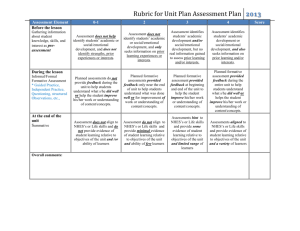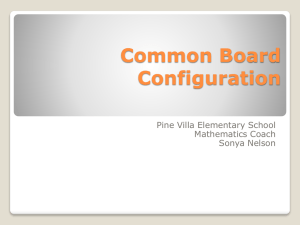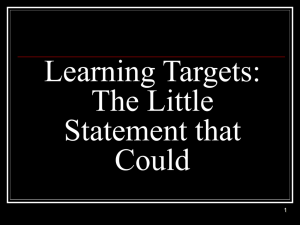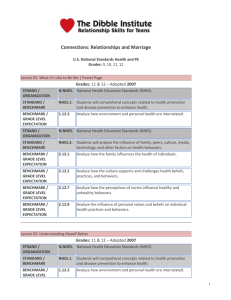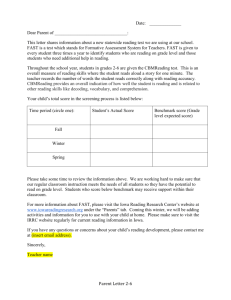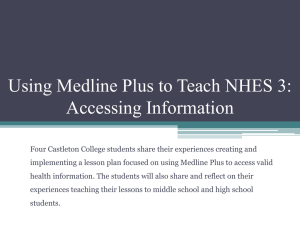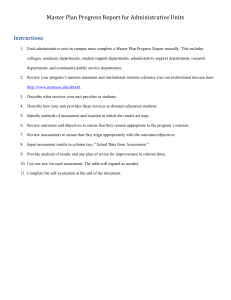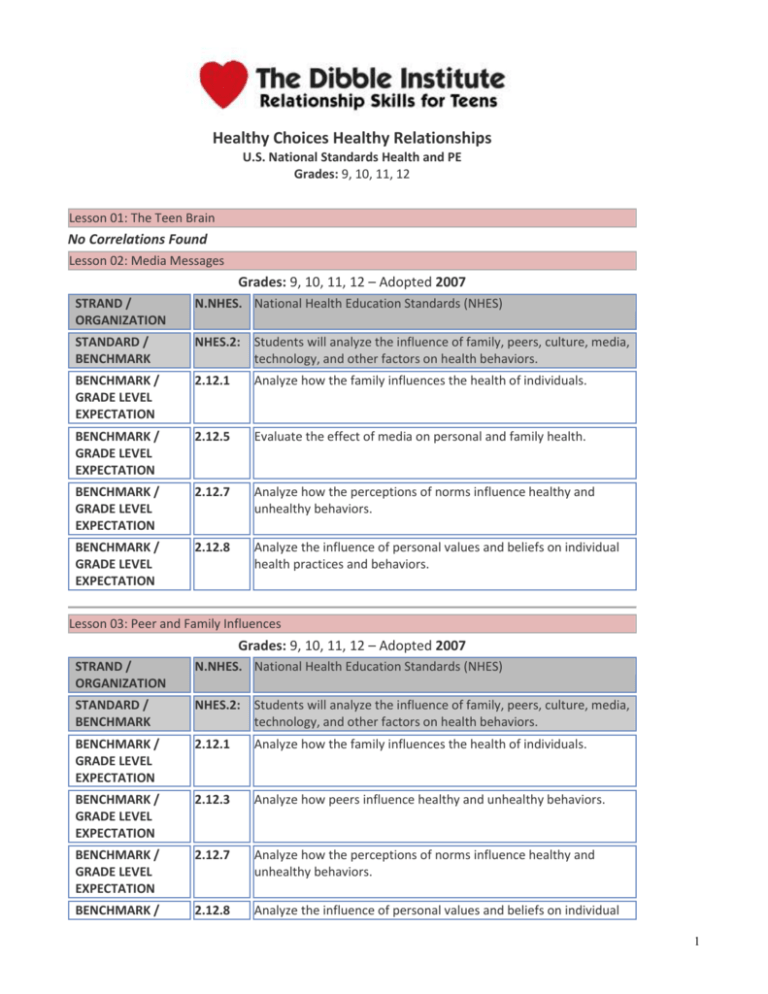
Healthy Choices Healthy Relationships
U.S. National Standards Health and PE
Grades: 9, 10, 11, 12
Lesson 01: The Teen Brain
No Correlations Found
Lesson 02: Media Messages
Grades: 9, 10, 11, 12 – Adopted 2007
STRAND /
ORGANIZATION
N.NHES. National Health Education Standards (NHES)
STANDARD /
BENCHMARK
NHES.2:
Students will analyze the influence of family, peers, culture, media,
technology, and other factors on health behaviors.
BENCHMARK /
GRADE LEVEL
EXPECTATION
2.12.1
Analyze how the family influences the health of individuals.
BENCHMARK /
GRADE LEVEL
EXPECTATION
2.12.5
Evaluate the effect of media on personal and family health.
BENCHMARK /
GRADE LEVEL
EXPECTATION
2.12.7
Analyze how the perceptions of norms influence healthy and
unhealthy behaviors.
BENCHMARK /
GRADE LEVEL
EXPECTATION
2.12.8
Analyze the influence of personal values and beliefs on individual
health practices and behaviors.
Lesson 03: Peer and Family Influences
Grades: 9, 10, 11, 12 – Adopted 2007
STRAND /
ORGANIZATION
N.NHES. National Health Education Standards (NHES)
STANDARD /
BENCHMARK
NHES.2:
Students will analyze the influence of family, peers, culture, media,
technology, and other factors on health behaviors.
BENCHMARK /
GRADE LEVEL
EXPECTATION
2.12.1
Analyze how the family influences the health of individuals.
BENCHMARK /
GRADE LEVEL
EXPECTATION
2.12.3
Analyze how peers influence healthy and unhealthy behaviors.
BENCHMARK /
GRADE LEVEL
EXPECTATION
2.12.7
Analyze how the perceptions of norms influence healthy and
unhealthy behaviors.
BENCHMARK /
2.12.8
Analyze the influence of personal values and beliefs on individual
1
GRADE LEVEL
EXPECTATION
health practices and behaviors.
STRAND /
ORGANIZATION
N.NHES. National Health Education Standards (NHES)
STANDARD /
BENCHMARK
NHES.4:
Demonstrate the ability to use interpersonal communication skills
to enhance health and avoid or reduce health risks.
BENCHMARK /
GRADE LEVEL
EXPECTATION
4.12.4
Demonstrate how to ask for and offer assistance to enhance the
health of self and others.
Lesson 04: Abuses and Excuses
Grades: 9, 10, 11, 12 – Adopted 2007
STRAND /
ORGANIZATION
N.NHES. National Health Education Standards (NHES)
STANDARD /
BENCHMARK
NHES.1:
Students will comprehend concepts related to health promotion
and disease prevention to enhance health.
BENCHMARK /
GRADE LEVEL
EXPECTATION
1.12.5
Propose ways to reduce or prevent injuries and health problems.
BENCHMARK /
GRADE LEVEL
EXPECTATION
1.12.8
Analyze personal susceptibility to injury, illness, or death if
engaging in unhealthy behaviors.
BENCHMARK /
GRADE LEVEL
EXPECTATION
1.12.9
Analyze the potential severity of injury or illness if engaging in
unhealthy behaviors.
STRAND /
ORGANIZATION
N.NHES. National Health Education Standards (NHES)
STANDARD /
BENCHMARK
NHES.2:
Students will analyze the influence of family, peers, culture, media,
technology, and other factors on health behaviors.
BENCHMARK /
GRADE LEVEL
EXPECTATION
2.12.9
Analyze how some health risk behaviors can influence the
likelihood of engaging in unhealthy behaviors.
STRAND /
ORGANIZATION
N.NHES. National Health Education Standards (NHES)
STANDARD /
BENCHMARK
NHES.5:
Demonstrate the ability to use decision-making skills to enhance
health.
BENCHMARK /
GRADE LEVEL
EXPECTATION
5.12.4
Generate alternatives to health-related issues or problems.
BENCHMARK /
GRADE LEVEL
EXPECTATION
5.12.5
Predict the potential short-term and long-term impact of each
alternative on self and others.
Lesson 05: Smart and Safe
Grades: 9, 10, 11, 12 – Adopted 2007
STRAND /
N.NHES. National Health Education Standards (NHES)
2
ORGANIZATION
STANDARD /
BENCHMARK
NHES.1:
Students will comprehend concepts related to health promotion
and disease prevention to enhance health.
BENCHMARK /
GRADE LEVEL
EXPECTATION
1.12.5
Propose ways to reduce or prevent injuries and health problems.
BENCHMARK /
GRADE LEVEL
EXPECTATION
1.12.8
Analyze personal susceptibility to injury, illness, or death if
engaging in unhealthy behaviors.
BENCHMARK /
GRADE LEVEL
EXPECTATION
1.12.9
Analyze the potential severity of injury or illness if engaging in
unhealthy behaviors.
STRAND /
ORGANIZATION
N.NHES. National Health Education Standards (NHES)
STANDARD /
BENCHMARK
NHES.2:
Students will analyze the influence of family, peers, culture, media,
technology, and other factors on health behaviors.
BENCHMARK /
GRADE LEVEL
EXPECTATION
2.12.7
Analyze how the perceptions of norms influence healthy and
unhealthy behaviors.
BENCHMARK /
GRADE LEVEL
EXPECTATION
2.12.8
Analyze the influence of personal values and beliefs on individual
health practices and behaviors.
BENCHMARK /
GRADE LEVEL
EXPECTATION
2.12.9
Analyze how some health risk behaviors can influence the
likelihood of engaging in unhealthy behaviors.
STRAND /
ORGANIZATION
N.NHES. National Health Education Standards (NHES)
STANDARD /
BENCHMARK
NHES.4:
Demonstrate the ability to use interpersonal communication skills
to enhance health and avoid or reduce health risks.
BENCHMARK /
GRADE LEVEL
EXPECTATION
4.12.3
Demonstrate strategies to prevent, manage, or resolve
interpersonal conflicts without harming self or others.
BENCHMARK /
GRADE LEVEL
EXPECTATION
4.12.4
Demonstrate how to ask for and offer assistance to enhance the
health of self and others.
STRAND /
ORGANIZATION
N.NHES. National Health Education Standards (NHES)
STANDARD /
BENCHMARK
NHES.5:
Demonstrate the ability to use decision-making skills to enhance
health.
BENCHMARK /
GRADE LEVEL
EXPECTATION
5.12.4
Generate alternatives to health-related issues or problems.
BENCHMARK /
GRADE LEVEL
EXPECTATION
5.12.5
Predict the potential short-term and long-term impact of each
alternative on self and others.
STRAND /
ORGANIZATION
N.NHES. National Health Education Standards (NHES)
3
STANDARD /
BENCHMARK
NHES.7:
Demonstrate the ability to practice health-enhancing behaviors and
avoid or reduce health risks.
BENCHMARK /
GRADE LEVEL
EXPECTATION
7.12.1
Analyze the role of individual responsibility for enhancing health.
Lesson 06: Bullying and the Bystander
Grades: 9, 10, 11, 12 – Adopted 2007
STRAND /
ORGANIZATION
N.NHES. National Health Education Standards (NHES)
STANDARD /
BENCHMARK
NHES.1:
Students will comprehend concepts related to health promotion
and disease prevention to enhance health.
BENCHMARK /
GRADE LEVEL
EXPECTATION
1.12.5
Propose ways to reduce or prevent injuries and health problems.
BENCHMARK /
GRADE LEVEL
EXPECTATION
1.12.6
Analyze the relationship between access to health care and health
status.
STRAND /
ORGANIZATION
N.NHES. National Health Education Standards (NHES)
STANDARD /
BENCHMARK
NHES.2:
Students will analyze the influence of family, peers, culture, media,
technology, and other factors on health behaviors.
BENCHMARK /
GRADE LEVEL
EXPECTATION
2.12.5
Evaluate the effect of media on personal and family health.
STRAND /
ORGANIZATION
N.NHES. National Health Education Standards (NHES)
STANDARD /
BENCHMARK
NHES.4:
Demonstrate the ability to use interpersonal communication skills
to enhance health and avoid or reduce health risks.
BENCHMARK /
GRADE LEVEL
EXPECTATION
4.12.3
Demonstrate strategies to prevent, manage, or resolve
interpersonal conflicts without harming self or others.
BENCHMARK /
GRADE LEVEL
EXPECTATION
4.12.4
Demonstrate how to ask for and offer assistance to enhance the
health of self and others.
STRAND /
ORGANIZATION
N.NHES. National Health Education Standards (NHES)
STANDARD /
BENCHMARK
NHES.7:
Demonstrate the ability to practice health-enhancing behaviors and
avoid or reduce health risks.
BENCHMARK /
GRADE LEVEL
EXPECTATION
7.12.1
Analyze the role of individual responsibility for enhancing health.
STRAND /
ORGANIZATION
N.NHES. National Health Education Standards (NHES)
STANDARD /
BENCHMARK
NHES.8:
Demonstrate the ability to advocate for personal, family, and
community health.
4
BENCHMARK /
GRADE LEVEL
EXPECTATION
8.12.1
Utilize accurate peer and societal norms to formulate a healthenhancing message.
BENCHMARK /
GRADE LEVEL
EXPECTATION
8.12.3
Work cooperatively as an advocate for improving personal, family,
and community health.
BENCHMARK /
GRADE LEVEL
EXPECTATION
8.12.4
Adapt health messages and communication techniques to a specific
target audience.
Lesson 07: Care, Consideration, and Respect
Grades: 9, 10, 11, 12 – Adopted 2007
STRAND /
ORGANIZATION
N.NHES. National Health Education Standards (NHES)
STANDARD /
BENCHMARK
NHES.4:
Demonstrate the ability to use interpersonal communication skills
to enhance health and avoid or reduce health risks.
BENCHMARK /
GRADE LEVEL
EXPECTATION
4.12.1
Use skills for communicating effectively with family, peers, and
others to enhance health.
STRAND /
ORGANIZATION
N.NHES. National Health Education Standards (NHES)
STANDARD /
BENCHMARK
NHES.7:
Demonstrate the ability to practice health-enhancing behaviors and
avoid or reduce health risks.
BENCHMARK /
GRADE LEVEL
EXPECTATION
7.12.1
Analyze the role of individual responsibility for enhancing health.
STRAND /
ORGANIZATION
N.NHES. National Health Education Standards (NHES)
STANDARD /
BENCHMARK
NHES.8:
Demonstrate the ability to advocate for personal, family, and
community health.
BENCHMARK /
GRADE LEVEL
EXPECTATION
8.12.2
Demonstrate how to influence and support others to make positive
health choices.
Lesson 08: Thinking It Through
Grades: 9, 10, 11, 12 – Adopted 2007
STRAND /
ORGANIZATION
N.NHES. National Health Education Standards (NHES)
STANDARD /
BENCHMARK
NHES.1:
Students will comprehend concepts related to health promotion
and disease prevention to enhance health.
BENCHMARK /
GRADE LEVEL
EXPECTATION
1.12.7
Compare and contrast the benefits of and barriers to practicing a
variety of healthy behaviors.
STRAND /
ORGANIZATION
N.NHES. National Health Education Standards (NHES)
STANDARD /
NHES.2:
Students will analyze the influence of family, peers, culture, media,
5
BENCHMARK
technology, and other factors on health behaviors.
BENCHMARK /
GRADE LEVEL
EXPECTATION
2.12.7
Analyze how the perceptions of norms influence healthy and
unhealthy behaviors.
BENCHMARK /
GRADE LEVEL
EXPECTATION
2.12.8
Analyze the influence of personal values and beliefs on individual
health practices and behaviors.
BENCHMARK /
GRADE LEVEL
EXPECTATION
2.12.9
Analyze how some health risk behaviors can influence the
likelihood of engaging in unhealthy behaviors.
STRAND /
ORGANIZATION
N.NHES. National Health Education Standards (NHES)
STANDARD /
BENCHMARK
NHES.4:
Demonstrate the ability to use interpersonal communication skills
to enhance health and avoid or reduce health risks.
BENCHMARK /
GRADE LEVEL
EXPECTATION
4.12.3
Demonstrate strategies to prevent, manage, or resolve
interpersonal conflicts without harming self or others.
BENCHMARK /
GRADE LEVEL
EXPECTATION
4.12.4
Demonstrate how to ask for and offer assistance to enhance the
health of self and others.
STRAND /
ORGANIZATION
N.NHES. National Health Education Standards (NHES)
STANDARD /
BENCHMARK
NHES.5:
Demonstrate the ability to use decision-making skills to enhance
health.
BENCHMARK /
GRADE LEVEL
EXPECTATION
5.12.1
Examine barriers that can hinder healthy decision making.
BENCHMARK /
GRADE LEVEL
EXPECTATION
5.12.2
Determine the value of applying a thoughtful decision-making
process in health-related situations.
BENCHMARK /
GRADE LEVEL
EXPECTATION
5.12.3
Justify when individual or collaborative decision making is
appropriate.
BENCHMARK /
GRADE LEVEL
EXPECTATION
5.12.4
Generate alternatives to health-related issues or problems.
BENCHMARK /
GRADE LEVEL
EXPECTATION
5.12.6
Defend the healthy choice when making decisions.
BENCHMARK /
GRADE LEVEL
EXPECTATION
5.12.7
Evaluate the effectiveness of health-related decisions.
STRAND /
ORGANIZATION
N.NHES. National Health Education Standards (NHES)
STANDARD /
BENCHMARK
NHES.7:
Demonstrate the ability to practice health-enhancing behaviors and
avoid or reduce health risks.
BENCHMARK /
7.12.2
Demonstrate a variety of healthy practices and behaviors that will
6
GRADE LEVEL
EXPECTATION
BENCHMARK /
GRADE LEVEL
EXPECTATION
maintain or improve the health of self and others.
7.12.3
Demonstrate a variety of behaviors to avoid or reduce health risks
to self and others.
Lesson 09: Pulling Things Together
Grades: 9, 10, 11, 12 – Adopted 2007
STRAND /
ORGANIZATION
N.NHES. National Health Education Standards (NHES)
STANDARD /
BENCHMARK
NHES.1:
Students will comprehend concepts related to health promotion
and disease prevention to enhance health.
BENCHMARK /
GRADE LEVEL
EXPECTATION
1.12.2
Describe the interrelationships of emotional, intellectual, physical,
and social health.
BENCHMARK /
GRADE LEVEL
EXPECTATION
1.12.6
Analyze the relationship between access to health care and health
status.
STRAND /
ORGANIZATION
N.NHES. National Health Education Standards (NHES)
STANDARD /
BENCHMARK
NHES.2:
Students will analyze the influence of family, peers, culture, media,
technology, and other factors on health behaviors.
BENCHMARK /
GRADE LEVEL
EXPECTATION
2.12.7
Analyze how the perceptions of norms influence healthy and
unhealthy behaviors.
BENCHMARK /
GRADE LEVEL
EXPECTATION
2.12.8
Analyze the influence of personal values and beliefs on individual
health practices and behaviors.
STRAND /
ORGANIZATION
N.NHES. National Health Education Standards (NHES)
STANDARD /
BENCHMARK
NHES.6:
Students will demonstrate the ability to use goal-setting skills to
enhance health.
BENCHMARK /
GRADE LEVEL
EXPECTATION
6.12.1
Assess personal health practices and overall health status.
BENCHMARK /
GRADE LEVEL
EXPECTATION
6.12.2
Develop a plan to attain a personal health goal that addresses
strengths, needs, and risks.
STRAND /
ORGANIZATION
N.NASPE. National Standards for Physical Education (NASPE)
STANDARD /
BENCHMARK
NASPE.2. Demonstrates understanding of movement concepts, principles,
strategies, and tactics as they apply to the learning and
performance of physical activities.
BENCHMARK /
GRADE LEVEL
High school students demonstrate knowledge and understanding
necessary to develop scientifically based personal activity plans that
7
include selected sports and activities. They use complex movement
concepts and principles to independently refine their skills and apply them
to the learning of new skills. Advanced activity related to disciplinespecific knowledge is integrated so that students develop the ability to
learn, self-assess, and improve movement skills independently. They also
can recognize elite-level performance.
EXPECTATION
GRADE LEVEL
EXPECTATION
2.2.
Develops realistic short-term and long-term personal fitness goals.
GRADE LEVEL
EXPECTATION
2.9.
Explains the impact of participation in selected sports/activities on
various components of fitness.
STRAND /
ORGANIZATION
N.NASPE. National Standards for Physical Education (NASPE)
STANDARD /
BENCHMARK
NASPE.3. Participates regularly in physical activity.
High school students fully recognize and understand the significance of
physical activity in the maintenance of a healthy lifestyle and possess the
skills, knowledge, interest, and desire to maintain an active lifestyle. They
willingly participate in physical activities on a regular basis that contribute
to the attainment of and maintenance of personal physical activity goals.
Students at this age make conscious decisions regarding their physical
activity participation and assume a mature role in managing their
participation based on needs, personal interests, capabilities, and
resources. They possess adequate movement capabilities and behavioral
skills that provide a basis for continued learning and regular physical
activity participation. They can independently apply appropriate training
principles to their own physical activity and can utilize pertinent scientific
principles to enhance their participation in a specific activity or sport. In
addition, students demonstrate an understanding of how and why adult
patterns of physical activity participation change throughout life and are
capable of implementing meaningful strategies to deal with those
changes.
BENCHMARK /
GRADE LEVEL
EXPECTATION
GRADE LEVEL
EXPECTATION
3.1.
Willingly participates in a variety of physical activities appropriate
for maintaining or enhancing a healthy, active lifestyle.
STRAND /
ORGANIZATION
N.NASPE. National Standards for Physical Education (NASPE)
STANDARD /
BENCHMARK
NASPE.6. Values physical activity for health, enjoyment, challenge, selfexpression, and/or social interaction.
High school students are more comfortable with their new interests and
their physiques, thus once again enjoying movement for the sheer
pleasure of moving. They enjoy the challenge of working hard to better
their skills, and they feel satisfaction when they are successful in
improving, especially while pursuing personal goals. They enjoy regular
participation in selected activities, either alone or with friends. They can
explain why participation in these activities is enjoyable and desirable.
BENCHMARK /
GRADE LEVEL
EXPECTATION
GRADE LEVEL
EXPECTATION
6.1.
Identifies reasons to participate in physical activity (e.g., health,
enjoyment, challenge, self-expression, and social interaction).
GRADE LEVEL
EXPECTATION
6.6.
Reflects on reasons for choosing to participate in selected physical
activities.
Lesson 10: Setting a Course
No Correlations Found
8
Lesson 11: I-Messages
Grades: 9, 10, 11, 12 – Adopted 2007
STRAND /
ORGANIZATION
N.NHES. National Health Education Standards (NHES)
STANDARD /
BENCHMARK
NHES.4:
Demonstrate the ability to use interpersonal communication skills
to enhance health and avoid or reduce health risks.
BENCHMARK /
GRADE LEVEL
EXPECTATION
4.12.1
Use skills for communicating effectively with family, peers, and
others to enhance health.
© 2012, EdGate Correlation Services, LLC. All Rights reserved.
For more information on Healthy Choices Healthy Relationships please contact:
The Dibble Institute
www.dibbleinstitute.org
800-695-7975
9

